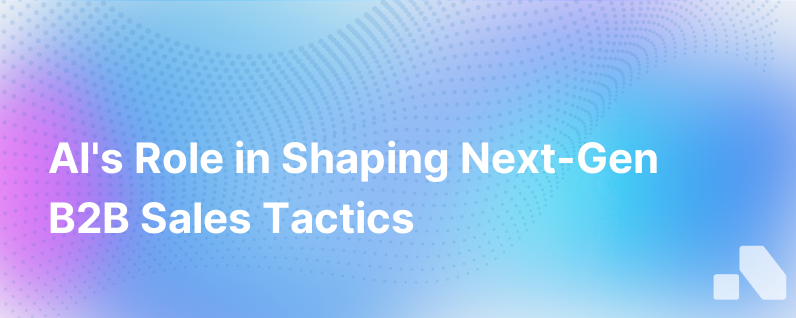
The rapid advancement of artificial intelligence (AI) is reshaping the landscape across numerous industries, with B2B sales being no exception. As we look toward the future, it’s clear that AI’s imprint on sales strategies will only continue to deepen, transforming the way businesses engage with prospects, nurture leads, and close deals.
The Emergence of AI in B2B Sales AI's foray into B2B sales isn't merely speculative; it's an ongoing revolution that's poised to make good on the promise of increasing both efficiency and effectiveness. Presently, AI applications have already started to take shape in the form of CRMs equipped with predictive analytics, chatbots that can generate and qualify leads, and intelligent systems capable of producing data-enriched sales forecasts. The magic of these AI tools lies in their ability to sift through massive sets of data to uncover valuable insights that can refine sales strategies and drive better results.
The Potential Impact on Sales Strategies With its ability to analyze data at unprecedented scales, AI promises to provide B2B sales strategies with an unparalleled edge. No longer will sales teams need to rely on intuition or incomplete data; instead, they'll be fortified by AI-driven insights that can more accurately predict market trends, buyer behaviors, and competitive dynamics.
AI-enhanced sales strategies will likely include account-based marketing (ABM) that's not just targeted but deeply personalized, powered by AI's knack to tailor content and outreach to the specific context of each prospect. Furthermore, AI can optimize sales operations through lead prioritization, ensuring that sales efforts are focused on the opportunities most likely to convert.
When it comes to sales forecasting, AI also offers significant advantages. By analyzing historical sales data and market conditions, AI can forecast future sales with a higher degree of accuracy than traditional methods. This enables companies to make more informed business decisions and efficiently allocate resources.
The Role of AI in Sales Engagement and Relationship Building Beyond the analytical might, AI's potential to revolutionize sales engagement and relationship-building practices is astounding. Imagine AI-driven platforms that can not only identify the right prospects but also provide insights into the best times to reach out, the most effective communication channels, and the key interests of these potential clients.
Advanced natural language processing (NLP) algorithms could one day enable AI systems to engage in meaningful conversations with prospects, answering queries and even handling objections with a finesse that rivals human intelligence. This level of sophisticated engagement would herald a new era where AI fundamentally enhances the relationship between businesses and their clients.
Preparing the Salesforce for an AI-Driven Future Ensuring competitive advantage in an AI-driven landscape calls for sales teams to become adept at interfacing with sophisticated AI tools. Training and development programs will be central to preparing sales professionals to work alongside AI, ensuring they can interpret AI-generated insights and take appropriate actions.
Sales leaders must also cultivate a culture that embraces AI-driven changes. This involves dispelling fears that AI will replace human sales jobs, instead highlighting how AI acts as an empowering tool that amplifies human capabilities.
Navigating Potential Challenges The integration of AI into sales also comes with its set of challenges that businesses must navigate carefully. Issues such as ensuring data privacy, addressing potential biases in AI algorithms, and integrating AI tools seamlessly with existing systems will require strategic oversight.
Moreover, the potential homogenization of sales strategies that rely too heavily on AI calls for a balance between data-driven tactics and the nuanced art of human salesmanship. It will be the unique human touch, after all, that will differentiate one AI-augmented sales approach from another.
Conclusion: AI as an Ally in B2B Sales As AI continues to mature, its impact on B2B sales strategies will be transformative, enabling sales teams to reach new heights of precision and personalization in their sales efforts. AI promises to elevate the role of the sales professional, turning data into actionable insights, and insights into strategic actions that win business.
Businesses that are early adopters of this technology stand to gain significant first-mover advantages. By leveraging AI to streamline operations, personalize sales outreach, and sharpen the accuracy of forecasts and decision-making, B2B companies can set themselves apart in a crowded, competitive marketplace.
The future of B2B sales is one where AI serves as both the backbone and the catalyst for innovative sales strategies. Such advancements will not only redefine the traditional frameworks of B2B transactions but also foster stronger, more impactful business relationships for years to come.
For those looking to stay ahead in this evolving landscape, exploring platforms like Aomni is a prudent step. As an AI solution designed for B2B sales, Aomni delivers actionable insights and personalized content in mere minutes, showcasing the immense potential of AI and its pivotal role in shaping the future of sales strategy.
Sources:
- AI in B2B Sales: How It’s Used and Its Biggest Benefits [New Data]
- Integrating AI in B2B Sales: A Roadmap for Success | Dasha.AI
- AI in B2B Sales: 5 Ways to Use Artificial Intelligence Effectively
- Future of Sales 2025: Why B2B Sales Needs to Shift to Data-Driven Selling
- AI in B2B Sales: Transforming Customer Engagement and Closing Deals - Email and Internet Marketing Blog
- Sales in 2025 - The Future of B2B Sales is all About Data and Hyperautomation - Blog
- Unleashing the Power of AI in B2B Sales: Strategies and Benefits